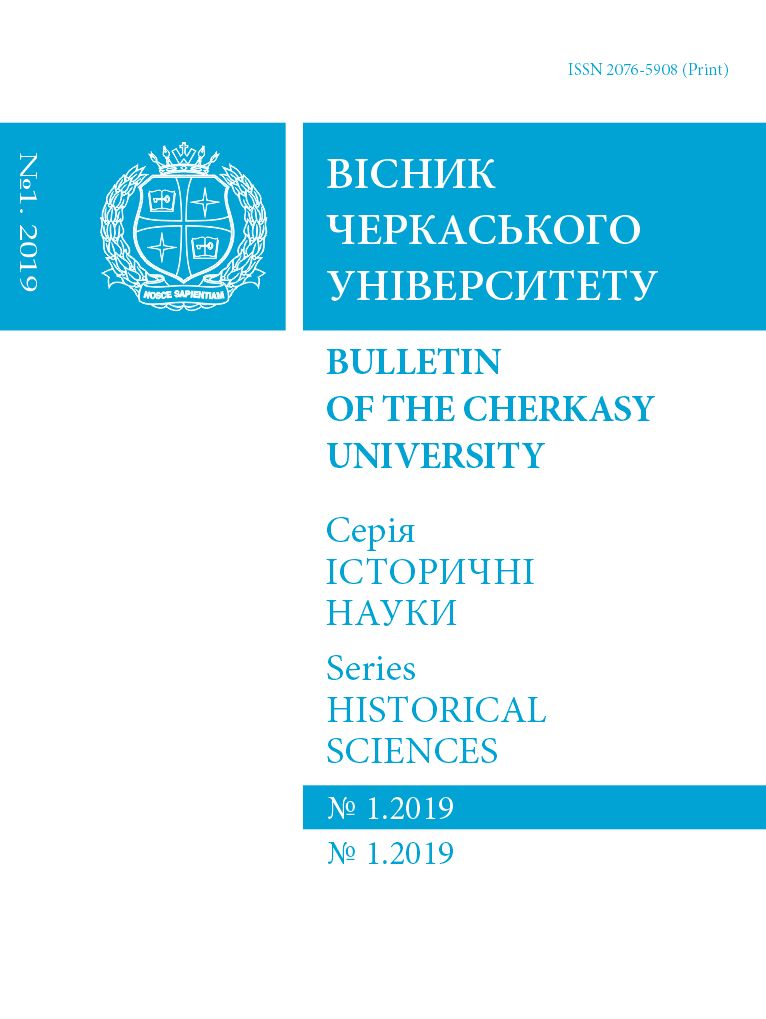The revolt of Avidius Cassius: backgrounds, course of events and aftermath
Main Article Content
Abstract
Abstract. Introduction. After the assassination of Gaius Julius Caesar, another period of civil wars began in Rome, the result of which was the establishment of the Principate. The Principate was essentially a veiled monarchy. Under this form of government there was no legal way to remove the Princeps from power, just as there was no such possibility under the dictatorships of Sulla or Caesar. Therefore, political opponents were forced to either accept the power of a particular Emperor, or hope to oust him through a revolt. Sometimes the conspirators were successful, but more often they were not. One of these failed actions was the rebellion of Gaius Avidius Cassius.
The aim of this study is to analyze the revolt of Avidius Cassius.
The methodology of the study is based on the content analysis of historical sources, as well the methods of analysis and synthesis
Main results and conclusions. During the reign of the Antonine dynasty, the Emperors passed on supreme power to their successors through adoption. This rule was broken by the Emperor Marcus Aurelius, who decided to transfer power to his son. Incorrect information about Marcus Aurelius’ death sparked a rebellion by Ovid Cassius. He was one of the leading Roman generals and hoped to be adopted by Marcus Aurelius. Perhaps Avidius Cassius decided to rebel under the influence of Faustina, the wife of Marcus Aurelius, who feared for her future if her husband were to die. However, there is evidence that Faustina was not involved in the rebellion of Cassius. The mutiny forced the Roman senators to take appropriate action. The Senate declared the leader of the rebels an enemy, and his property was confiscated. Emperor Marcus Aurelius was forced to postpone the war he was waging with the tribes of the Sarmatians and Marcomanni, and went against the rebels. Avidius Cassius’ expectations of widespread support for his actions by the Roman army and aristocracy did not materialize. He was partially supported by Egypt, Syria and Asia Minor. The battle between the armies of Marcus Aurelius and the legions of Avidius Cassius did not take place. Considering the futility of further fighting, he was killed by his own soldiers. Although Emperor Marcus Aurelius responded to this rebellion with repression, the scale of the repression was smaller than might be expected. Marcus Aurelius was magnanimous to Cassius’ family. The revolt of Avidius Cassius made a very unpleasant impression on Marcus Aurelius. The Emperor believed that this whole story did not give him anything positive. Proof of this is the fact that Marcus Aurelius ordered the burning of all files in this case so that no one could accuse him because of them. To prevent similar cases in the future, the Senate forbade anyone to rule the province with which he is associated by origin. Indeed, Cassius started a revolt as governor of Syria, which included his hometown of Cyrrhus.
Article Details
References
Крист К. История времен римских императоров от Августа до Константина / К. Крист. – Ростов н/Д. : Феникс, 1997. – Т. 1. – 574 с.
Машкин Н.А. Принципат Августа: происхождение и социальная сущность. – Москва; Ленинград: Издательство АН СССР, 1949. – 686 с.
Петречко О. Династична політика як складова системи принципату / О. Петречко // Проблеми гуманітарних наук: збірник наукових праць Дрогобицького державного педагогічного університету імені Івана Франка. – 2007. – Серія «Історія». – Вип. 20. – С. 128 – 137.
Петречко О. Суспільно-політичний розвиток Римської імперії в І – на поч. ІІІ ст. н.е.: від «відновленої» Республіки до сенатської монархії / О. Петречко. – Львів: видавничий центр ЛНУ імені Івана Франка, 2009. – 396 с.
Birley A. R. Marcus Aurelius: a biography / A. Birley. – London; New York: Routledge, 2000. – 320 p.
Bowman A.K. A letter of Avidius Cassius // The Journal of Roman Studies. – 1970. – Vol. 60. – P. 20–26.
Jarvis P. Avidius Cassius and Maecianus in the Historia Augusta // Mnemosyne. – 2015. – 68(4) . – P. 666–676. doi: https://doi.org/10.1163/1568525X-12341562.
Millar F. Review of Avidio Cassio, by Maria Laura Astarita // The Classical Review. – 1985. – 35(2). – P. 412. Retrieved from: http://www.jstor.org/stable/3063383.
Syme R. Avidius Cassius: His Rank, Age, and Quality / Ronald Syme. Roman Papers. Vol. V. Edited Anthony R. Birley. – Oxford: Clarendon Press, 1988. – P. 689–701.
References
Krist, K. (1997). The history of the Roman Emperors from Augustus to Constantine (Vol. I). Rostov-na-Donu: Feniks (in Russ.).
Mashkin N.A. (1949). Principate of Augustus: origin and social essence. Moscow; Leningrad: Publishing House of the Academy of Sciences of the USSR (in Russ.).
Petrechko, O. (2007). The Dynastic Policy as the Component of Principate. Problems of Humanities. History Series: a collection of scientific articles of the Drohobych Ivan Franko State Pedagogical University, 20, 128 – 137 (in Ukr.).
Petrechko, O. (2009). Socio-political development of the Roman Empire in the first century – at the beginning of the third century A.D.: from «restored» Republic to the Senate monarchy. Lviv: vydavnychyi tsentr LNU imeni Ivana Franka (in Ukr).
Birley, A.R. (2000). Marcus Aurelius: a biography. London; New York: Routledge (in Englisg).
Bowman, A.K. (1970). A letter of Avidius Cassius // The Journal of Roman Studies, 60, 20 – 26.
Jarvis, P. (2015). Avidius Cassius and Maecianus in the Historia Augusta, Mnemosyne, 68 (4), 666–676.
Millar, F. (1985). [Review of Avidio Cassio, by Maria Laura Astarita]. The Classical Review, 35(2), 412–412. Retrieved from: http://www.jstor.org/stable/3063383.
Syme, R. (1988). Avidius Cassius: His Rank, Age, and Quality / Roman Papers. Vol. V. Edited Anthony R. Birley. Oxford: Clarendon Press.

